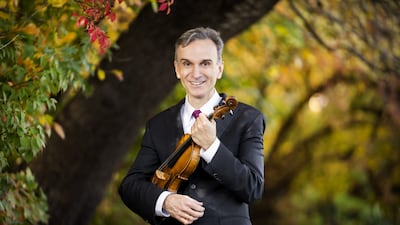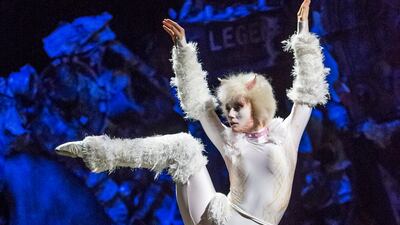Our Working Wonders of the UAE series takes you to some of the country's most recognisable destinations to uncover the daily duties of the talented employees working there
As a violinist, Paolo Petrocelli has performed on many of the world's biggest stages.
He's been centre stage at MTV and even festivals with an indie folk band.
Now, as head of Dubai Opera, the Italian is bringing some of the world's best artists to the UAE.
The 38-year-old was previously on the Rome Opera House board and, as a cultural leader, a key member of prestigious international organisations including the UN, Unesco and the World Economic Forum.
In his downtime, Dr Petrocelli is seeking to become fluent in Arabic and on the oud.
He invited The National along to the 2,000-seat Dubai Opera to reveal why it was his ideal career move.
What drove you towards music?
I was born in Rome so it was natural to be exposed to theatre, music, and arts and culture.
Every day I'm passionate about dealing with artists, music, projects, with people, the audience and with the impact music generates in communities.
It's not just about a love for the arts on a purely spectacle level.
Music facilitates interaction between human beings on an emotional level.
It is an incredible tool, not just to fill a concert hall but to bring people together and create bridges between cultures and nations.
Why move from the stage to the office?
I've been playing the violin for 20 years. It was really the beginning of my professional career [but] I was gradually shifting towards becoming a manager in the classical music/opera sector.
Music brings people and organisations together so it was natural to commit on an international level, to really interact with different institutions in the music and cultural field.
It's been an exciting journey. I have had the opportunity to work in many environments, from opera houses to orchestras, but also contributing as a young professional to the development of major international projects.
Did you know Dubai before your appointment?
I have been very active in the Middle East for over 10 years because of my curiosity for cultures and music.
I realised there were opportunities to collaborate with institutions and artists from Europe and the Middle East.
That’s why I established an organisation for the promotion of music diplomacy, to use music to create understanding and co-operation between people and nations, EMMA For Peace.
I also worked as an adviser for Royal Opera House Muscat, and the Ministry of Culture of Saudi Arabia.
My first time in Dubai was 2013. I was in contact with Dubai Opera management, having conversations about bringing different projects, including a potential Rome Opera production.
I followed different stages of development of Dubai Opera so I was very familiar with the organisation.
How do you view your role?
A big part of my job is to manage people, an organisation, a structure, but it’s also about promoting a cultural vision – how we can, as an opera house, inspire society, and elevate people through arts and music.
It’s about finding the right balance between financial aspects and creative ideas. How we are going to contribute to the development of communities through our programming.
You need to understand the society, interact as much as possible at every level; find a common language between artists, the community, institutions, the private sector.
You bring together so many different interests and the final outcome should be something that makes sense for everyone.
How does Dubai Opera differ from other venues?
Rome Opera House has been there for more than 150 years. Dubai Opera opened in 2016 … a completely different scenario. The landscape of the city and the population is different.
We still have to define cultural identity, how Dubai Opera is different from Sydney Opera House, or Met Opera in New York.
Theatres in Europe have seen so much in terms of history, great composers and conductors, a different energy. You find some dust there, in a metaphorical sense.
Is your inbox busy with potential shows?
Dubai is becoming a world capital and artists want to come here.
We need to come up with our vision and artistic direction because if you bring a little bit of everything without a clear recipe, the final dish is not going to be good.
You need to find the right balance, that stimulates the entire community … it's definitely very challenging.
I believe what we are planning for the future allows us to be seen as an institution that is open, accessible and really speaks to everyone.
When I see an artist that excites a lot of people and I contributed to bringing this artist to the stage, I’m happy I did my part.
Does it feel good to be in charge?
It’s a big responsibility, a big challenge, but I’m very confident we will do a good job with my team.
I came with a certain level of understanding and awareness of where Dubai is right now. And where Dubai is going.

It is important we have the opportunity to contribute to the development of the entire cultural landscape and ecosystem of this country.
At Dubai Opera, we can play an even bigger role, not just here in Dubai but in the region.
What we are trying to achieve is to elevate and expand our mission, which is not just about offering entertainment but about contributing to the cultural identity of this country.
Is it tough attempting to please everyone?
We work on the concept that Dubai Opera is a platform where we can celebrate cultures of the world.
This was already happening; now we are empowering this concept and really trying to present ourselves as a unique institution because of the uniqueness of the society of Dubai.
This has to be reflected in the way we reach out to our audience and the way we programme our season. It is not just about saying: “Let’s have a bit of everything.”
Let us connect with different nationalities, join forces with cultural organisations from different countries, build … a more structured cultural project.
It’s about planning, artistic programming, developing strategic partnerships, reaching the audience, not just at the box office but on a broader level. Thinking also how to inspire the young community.
We are in a position to take courageous decisions.
Does the 2023-24 programme reflect that?
We managed to programme big and important productions, performances and concerts.
Not just in terms of magnitude but how, through this season, we are going to position Dubai Opera even more at the front line of the best cultural institutions in the region, if not globally.
It’s one of our objectives to – in upcoming years – come up with Dubai Opera productions, besides what we bring to Dubai. Artistic ideas generated from Dubai Opera, then potentially developed with the support of other theatres.
We can serve as a platform where we plug in some great productions. At the same time, our platform should and I’m sure will generate and cultivate ideas by itself.
The entire ecosystem of music and culture in Dubai is growing. Some key elements, like an orchestra, are missing. It will take time but it will happen. I’m very confident about that.













